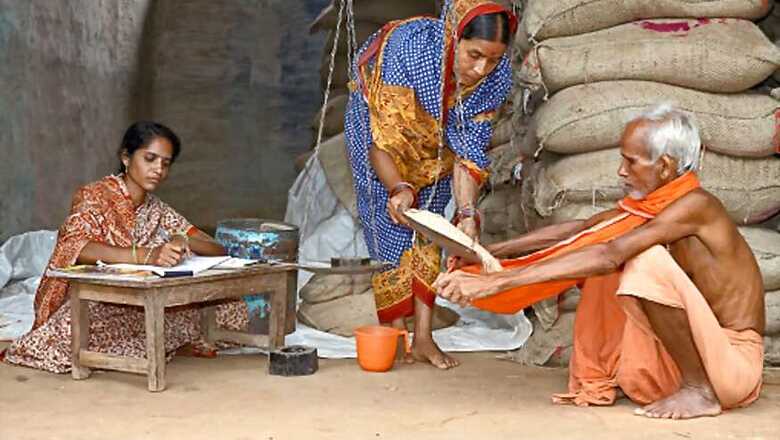
views
New Delhi: The central government’s computerised ration card portability scheme, named ‘One Nation, One Ration Card’, to make a single ration card eligible at any fair price shop across the country is designed to exclude identified beneficiaries if their cards are not seeded to Aadhaar.
It will also not include those fair price shops (FPS) that are not equipped with operational electronic point of sale (ePOS) and biometric/Aadhaar authentication system. In fact, these are the reasons that the scheme is hanging fire for the last several months.
The broad idea of the scheme appears more to weed out duplicate or bogus ration-card holders who avail subsidised foodgrain benefits, since there is no clarity on how an FPS seller will cope with his/her monthly quota if he is to cater to additional (migrant) card holders. However, there are also fears of genuine and deserving beneficiaries being left out in the process.
The government has declared that it will not alter the foodgrain entitlement of any state to cater to the scheme. As of now, ration card holders can avail their entitlement of subsidised foodgrains only in their home state.
Now the central government scheme will integrate all state targeted public distribution systems to a national repository of all ration cards/beneficiaries who are eligible to transact under the portability scheme with automated FPSs.
While this may work for identifying bogus or duplicate ration card holders, consumers who have issues with Aadhaar either by virtue of being migration labourers, tenants or mismatch of data shall not be eligible to obtain ration under the portability scheme.
The death of three children from hunger last year in Dumrao block of Buxor district in Bihar because their parents could not link their ration card to Aadhar is too fresh in memory to be ignored, as also the death of an eight-year-old girl in Hathras in Uttar Pradesh because her jobless father did not have a ration card.
Under the National Food Security Act (NFSA), 2013, the government is obliged to give discounted foodgrains every month to targeted beneficiaries who have been identified by each state government.
As such, 75 per cent of rural and 50 per cent of urban population is eligible for the benefit with an estimated annual foodgrain outgo of about 549 lakh tonnes. Under the scheme, rice is sold at Rs 3 per kg, wheat at Rs 2 per kg and coarse cereals at Re 1 per kg.
A card-holder household gets 5kg of foodgrains per person per month, while the 2.5 crore Antyodaya Anna Yojna households continue to get their monthly quota of 35kg of foodgrains per month.
Following the implementation of the NFSA, only ‘priority beneficiaries’ (earlier known as below poverty line category citizens) are eligible.
The poverty criterion has now been de-linked from the provision of rationed foodgrains as a new set of qualification parameters have been introduced which actually leave out a lot of the poor and deserving.
The ‘One Nation, One Ration Card’ scheme has been initiated as part of reforms of the Targeted Public Distribution System, through a single portability electronic card under the ‘Public Distribution System Network’.
The Ministry of Food and Procurement is hopeful that the computerised scheme will be fully implemented across the country by June next year.
So far, 4,37,171 of the total 5,34,960 fair price shops are said to have been automated through installation of ePOS device, along with biometric/Aadhaar authentication facilities which are now mandatory for availing rations.
However, it is not clear how many are located in high-migration states such as Bihar and West Bengal. Official estimates show that Aadhaar seeding of at least one member of the beneficiary household stands at 81.4 per cent across the country.
According to government sources, the nation-wide portability scheme will enable ration card holders to stake claim of their monthly quota of rations in any state and will be particularly beneficial to migrant labourers/workers or people with transferable employment. As per one estimate, about 4.1 crore workers migrate out of their state for seasonal work.
Eleven states are already in the loop for intra-state portability and four more will be added by January 2020.
Intra-state portability is functional in 11 states, including Andhra Pradesh, Haryana, Karnataka, Kerala, Maharashtra, Rajasthan, Telangana, Tripura, Gujarat, Jharkhand and Punjab. The four new states which are ready to roll out the scheme by end of next month are Goa, Madhya Pradesh, Tripura and Jharkhand.
National portability is partially functional in some districts of Madhya Pradesh, Odhisha and Chhattisgarh.
The government is encouraging clusters of adjoining states for ease of business and as such, inter-state portability is feasible in a cluster of Andhra Pradesh and Telangana; Gujarat and Maharashtra; Haryana and Rajasthan and Karnataka and Kerala.
The government says that it will bring 20 states and union territories under the fold of National Portability by June 2020.
Sources say end-to-end computerisation of fair price shops will also work as a deterrent to diversion of discounted foodgrains for which the subsidy bill stood at more than Rs 13,2087 crore till the end of November this year.
On the anvil is also national de-duplication of all beneficiaries and enabling of biometric authentication to remove ineligible ones.
Civil society groups fear that through change of criterion a lot of poor and illiterate people had been left out of the Targeted Public Distribution System and yet another digitalised exercise might leave out more deserving beneficiaries.
They are, in fact, asking for universal PDS, which was also a recommendation of the MS Swaminathan Commission Report on Farmers.
(The author is a senior journalist based in New Delhi. Views expressed are personal.)




















Comments
0 comment